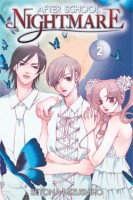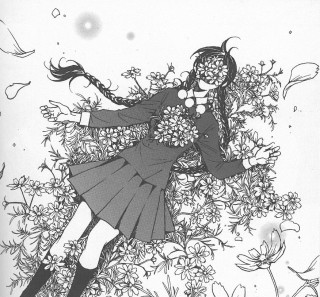 Creator: Setona Mizushiro
Creator: Setona Mizushiro
U.S. publisher: Go! Comi
ISBN: 9781933617176
Released: December 2006
Original release: 2005
The second volume of Setona Mizushiro’s After School Nightmare, a disconcerting shoujo manga series with dark psychological elements, was originally released in Japan in 2005. The English-language translation was published by Go! Comi in 2007. The entire ten-volume series is now out-of-print in English, but happily the individual manga can still be found relatively easily. I had initially read the first few volumes of After School Nightmare by borrowing them from a library before deciding to track down a set of my own. However, I never got around to reading the entire manga until now because, although the beginning of the series immediately captured my attention, the manga was honestly discomforting. The first volume introduces a surreal setting in which dreams can be just as terrifying and damaging as the realities from which the characters would like to escape. After School Nightmare is a manga that is both fantastically strange and oddly compelling.
Conflicted and confused over his gender due to having a body that is neither entirely male nor female, Mashiro has tried to keep his physical condition hidden from others by living his life as a boy, but now that closely kept secret is out. Every Thursday after school, he and a handful of other students participate in a special class required for their graduation. During the class they literally share a dream, or rather a nightmare, together. In the process their true selves are revealed to the other students, and so a few of Mashiro’s classmates have found out about his body. Within the dreams, Mashiro has fallen victim to the cruel Black Knight, another student whose identity he is unsure of but who he suspects may be Sou. In waking reality, Sou has forcibly kissed Mashiro, insisting that he is a girl and even going so far as to declare his love for him. It is not a situation that Mashiro is comfortable with and if he can get up the courage he intends to confront Sou, whether it be in the nightmare or outside of it.
 Frankly, Sou is a jerk. He may be earnest in his feelings for Mashiro, and he’s at least started to try to reign in his aggressiveness, but he has yet to show Mashiro any sort of respect. I can’t like the guy because of the way he treats Mashiro, however I do still have some sympathy for him. Sou, like all of the other students in the special class, suffers greatly from emotional abuse and trauma. Still, that does not excuse his behavior towards Mashiro. Even so, he is positioned as one of Mashiro’s two potential romantic interests in After School Nightmare, the other being Kureha. Although she has made an exception and is currently dating Mashiro, she hates and despises men. Mashiro and Kureha generally get along, but their relationship isn’t as healthy as it could be, mostly but not entirely due to Mashiro’s continued insecurities over his gender. He seems to believe that his identity is defined and determined by the person he is intimate with. Because he’s desperate to be seen as a man, this calls into question whether or not he’s actually in love with Kureha, or if he’s simply dating her as a way to prove his masculinity.
Frankly, Sou is a jerk. He may be earnest in his feelings for Mashiro, and he’s at least started to try to reign in his aggressiveness, but he has yet to show Mashiro any sort of respect. I can’t like the guy because of the way he treats Mashiro, however I do still have some sympathy for him. Sou, like all of the other students in the special class, suffers greatly from emotional abuse and trauma. Still, that does not excuse his behavior towards Mashiro. Even so, he is positioned as one of Mashiro’s two potential romantic interests in After School Nightmare, the other being Kureha. Although she has made an exception and is currently dating Mashiro, she hates and despises men. Mashiro and Kureha generally get along, but their relationship isn’t as healthy as it could be, mostly but not entirely due to Mashiro’s continued insecurities over his gender. He seems to believe that his identity is defined and determined by the person he is intimate with. Because he’s desperate to be seen as a man, this calls into question whether or not he’s actually in love with Kureha, or if he’s simply dating her as a way to prove his masculinity.
The shared dreams in After School Nightmare are a way of forcing the students to face and work through the darkness that exists within their hearts and psyches. In theory, those nightmares are supposedly intended to be kept separate from reality, but the two worlds do have an effect on each other. The distorted forms the students take within the dreams can be terrifying, but what really makes them so disturbing are the troubling truths and dark pasts that they reveal. The pain, suffering, and hatred that is readily visible in the nightmares still exists and is present in their waking lives. Usually hidden, suppressed, or otherwise concealed, the prejudices that the students carry within them occasionally erupt violently. The skills and maturity needed to deal with these emotional, psychological, and physical disturbances are at least in part being developed within the dreams. In After School Nightmare, Volume 2, Mashiro begins to learn the importance and power of mental strength and fortitude, but both he and his classmates all still have room to learn and grow.

Sou is the reason I dropped this series
I think that’s understandable! He’s an interesting character, but so far not a particularly pleasant one.